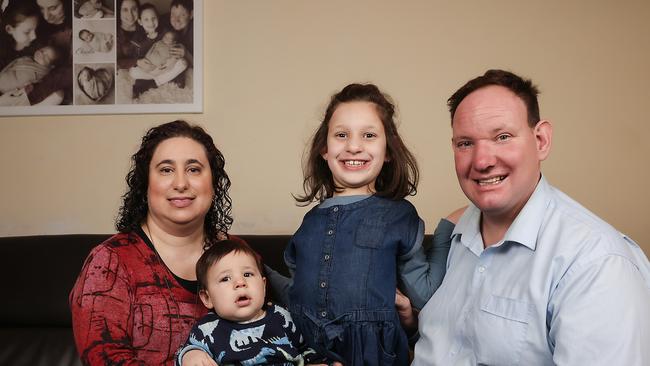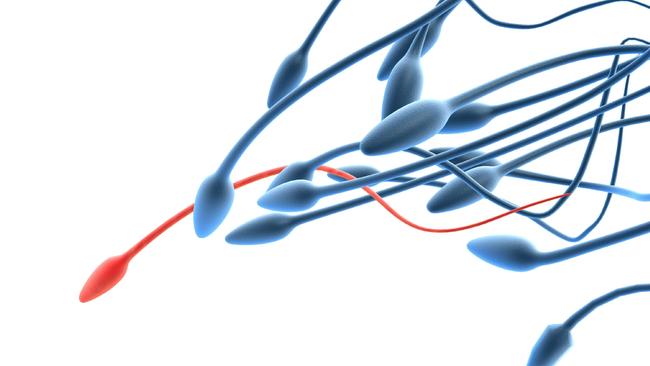Antioxidants helping to boost fertilisation in world-first trial led by Melbourne IVF team
In a breakthrough for men with poor sperm, Melbourne scientists have found antioxidants can help improve egg fertilisation rates by 10 per cent.
Victoria
Don't miss out on the headlines from Victoria. Followed categories will be added to My News.
In an important breakthrough for men with poor sperm, Melbourne IVF researchers have found a trio of antioxidants can help improve human egg fertilisation rates by 10 per cent.
A randomised controlled study led by Melbourne IVF’s scientific director David Gardner has confirmed what he describes as a dramatic increase where ‘male factor’ infertility is involved.
University of Melbourne’s Professor Gardner said patients on the world-first trial undergoing a technique called ICSI had more embryos for transfer and freezing with the addition of antioxidants to the IVF embryo culture media. This is the complex solution used to support cell growth.
ICSI (intracytoplasmic sperm injection insemination) is a technique to assist male infertility where a single sperm is injected directly into an egg.
He explained the trial involved half of the recruited patients receiving standard IVF media for egg and sperm collection, insemination and embryo culture. The other half of the patients received the same media but with the addition of three antioxidants: acetyl-L-carnitine (ALC), N-acetyl-L-cysteine (NAC) and α-lipoic acid (ALA).

So successful has the three-year trial been, he says, that the antioxidant media that was developed by his laboratory at the University of Melbourne is now being offered broadly.
“A 10 per cent increase in fertilisation is a sizeable jump,” Professor Gardner says. “In particular for couples where ‘male factor’ is involved, which is about 50 per cent of our patients.”
Antioxidants are molecules that protect cells and tissues from damage and Professor Gardner says some are removed when egg and sperm are “washed” in preparation for IVF.
“Adding these antioxidants back at the time the culture media is made is getting us closer to nature,” he said.
While further studies are ongoing to understand why the addition of these particular antioxidants appear to assist in male infertility, Professor Gardner said it was known that sperm were particularly sensitive to oxidative stress. This is the imbalance between free radicals and antioxidants.
“This story really started about 30 years ago,” Professor Gardner says.
“We started looking at this back then as animal studies started coming out across the world. Then about 10 years ago our team took a different approach and found that the addition of antioxidants in animal models had benefits for embryo development and foetal growth.
“We had learnt a lot more about antioxidants so rather than using one we did a study and found out this group of three was better than each of them on their own.
“They all do different things so by having the three as a combination gave us the big breakthrough.”
Melbourne IVF recruited almost 1500 Melbourne couples for its major trial, the results of which have just been presented at the annual meeting of the European Society of Human Reproduction and Embryology in Copenhagen, Denmark.
Professor Gardner told the international meeting overnight that the results were encouraging.
“It wasn’t the easiest trial to do, recruiting patients during a worldwide pandemic,” he said. “The exciting results fire our commitment to further trials.”

Steve Gillam would never have known he had the genetic condition Klinefelter’s syndrome if he and wife Sarah did not turn to IVF to achieve their dream of a family.
The Bayswater business owner underwent standard fertility testing with his wife as part of their IVF journey and was shocked to learn he not only had the syndrome, but that it could impact his chances of having a child.
In most males it can cause low testosterone levels and little or no sperm.
Steve says now he is grateful because it has meant he is aware of other underlying issues the syndrome can cause.
He is also grateful to IVF because thanks to the ICSI technique, where a single sperm is injected directly into an egg, the couple are now proud parents to daughter Chole (7) and 10-month-old son Charlie.
“Information is gold,” Mrs Gillam said. “We cried when we got the news initially, but then we picked ourselves up and knew we had options.”
She said without the science behind ICSI they would never have been able to have children.
Of this latest breakthrough for male-factor infertility, they say it makes them proud.
“We are also blessed to have two children born by the miracle of IVF,” Mrs Gillam said. “Hopefully this encourages other couples on their journey.”
More Coverage
Originally published as Antioxidants helping to boost fertilisation in world-first trial led by Melbourne IVF team





